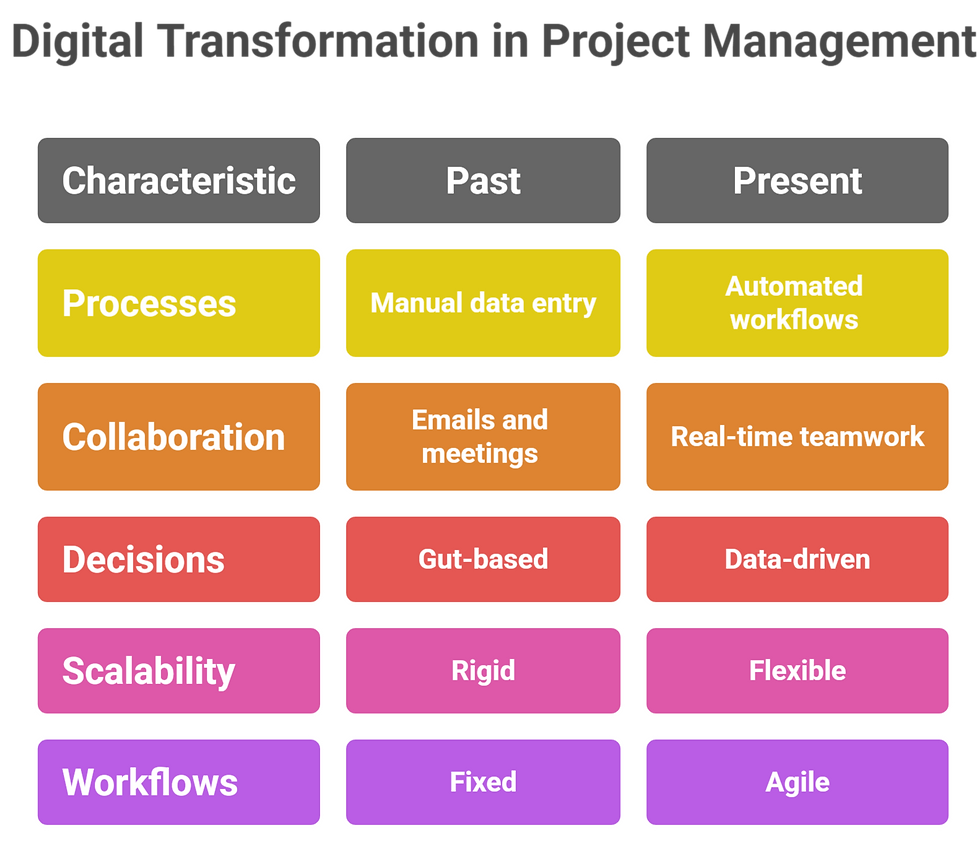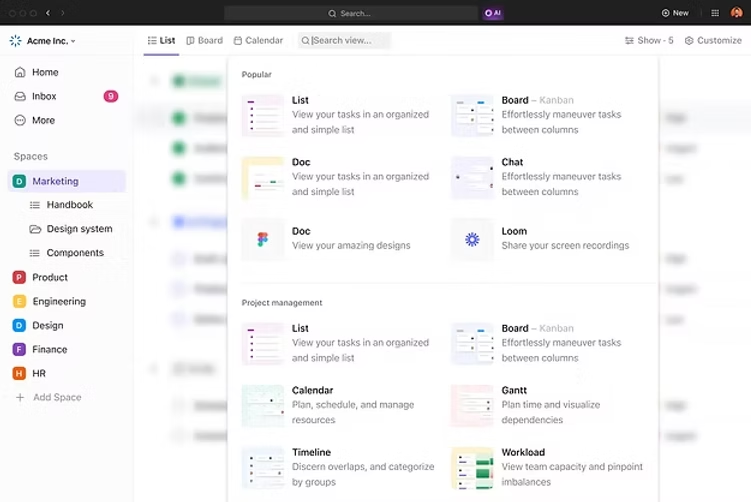Project Management in the Era of Digital Transformation
- Yasir Ali Warraich

- Jun 10, 2025
- 6 min read
Updated: Jan 21
Not long ago, managing a project meant spreadsheets, emails, and endless meetings. Teams worked in silos, updates came late, and decisions were often based on guesswork. Today, that world no longer exists. Digital transformation has changed how businesses operate, how teams collaborate, and how projects succeed or fail.
Project management is no longer just about timelines and tasks. It’s about data, speed, adaptability, and intelligence. Artificial Intelligence (AI) has become a silent partner in planning, execution, and delivery. From predicting risks to automating routine work, AI is reshaping how projects are managed across industries.
In this article, we explore project management in the era of digital transformation, the role of AI, the tools driving this change, and why ClickUp stands out as the preferred AI-powered project management solution for modern teams.
What is Digital Transformation in Project Management?
Digital transformation in project management refers to the integration of advanced technologies into project planning, execution, and monitoring.
It’s about replacing manual processes with automated systems to streamline operations, improve collaboration, and enhance decision-making. This shift has become essential as businesses strive to stay competitive in a rapidly evolving digital landscape.
Digital transformation is not just about tools; it’s about adopting a mindset of continuous improvement. By leveraging technologies like cloud-based platforms, AI, and automation, project managers can deliver better outcomes with greater efficiency.
How is Digital Transformation Driving Change in Project Management?
Digital transformation is revolutionizing project management by:
📜 Past vs. 🚀 Present
Manual Processes
Past: Tedious data entry and repetitive tasks.
Present: Automated workflows with tools like ClickUp, freeing time for strategy.
Fragmented Collaboration
Past: Emails and meetings dominated communication.
Present: Real-time teamwork through cloud-based platforms.
Gut-Based Decisions
Past: Limited data insights for decision-making.
Present: Advanced analytics deliver actionable, data-driven insights.
Rigid Scalability
Past: Expanding operations was slow and resource-intensive.
Present: Digital tools scale effortlessly with project demands.
Fixed Workflows
Past: Teams struggled to adapt to last-minute changes.
Present: Agile methodologies enable quick and flexible responses.

Why is Cross-Departmental Collaboration Essential in Digital Project Management?
Cross-departmental collaboration ensures that all parts of an organization work towards common goals.
In digital project management, this collaboration is enhanced through:
Centralized Platforms: Tools like ClickUp serve as a single source of truth for all departments.
Transparency: Everyone has access to the same data, reducing miscommunication.
Faster Problem-Solving: Diverse perspectives lead to quicker and more innovative solutions.
Improved Accountability: Clear task assignments and progress tracking help teams stay on track.

How Can C-Level Executives Implement Digital Transformation in Project Management?
C-level executives play a crucial role in driving digital transformation.
Here are steps they can take:
Set a Clear Vision: Define what digital transformation means for the organization and how it aligns with business goals.
Invest in the Right Tools: Choose platforms like ClickUp that offer scalability, customization, and ease of use.
Foster a Culture of Innovation: Encourage teams to embrace change and experiment with new technologies.
Provide Training: Equip employees with the skills needed to use digital tools effectively.
Monitor and Adapt: Continuously assess the impact of digital initiatives and make adjustments as needed.

The Role of AI in Modern Project Management
AI is not replacing project managers—it is empowering them. In today’s digital environment, AI acts as an assistant that processes large volumes of data and highlights what matters most.
How AI Supports Project Managers
AI helps by:
Predicting delays before they happen
Suggesting task priorities
Automating status updates
Analyzing team workload
Creating smart summaries
AI as a Decision-Making Partner
Instead of relying only on experience, managers now combine human judgment with AI insights. This leads to faster and more confident decisions.
Core Pillars of AI-Driven Project Management
Digital transformation stands on strong foundations. AI-powered project management is built around key pillars that ensure efficiency and adaptability.
1. Automation
Repetitive tasks like reminders, assignments, and reporting are automated, saving time and reducing errors.
2. Visibility
Dashboards provide real-time views of progress, risks, and performance.
3. Intelligence
AI analyzes patterns and provides recommendations for improvement.
4. Collaboration
Teams stay aligned with shared goals, tasks, and communication spaces.
What are the Key Digital Tools Reshaping Project Management?
Digital tools are the backbone of modern project management. While there are many options available, ClickUp stands out as a top choice for businesses looking to streamline operations and boost productivity.

Here’s why:
ClickUp Features:
Task Automation: Automates routine processes, reducing manual effort.
Custom Dashboards: Provides a clear overview of project status and performance metrics.

Collaboration Tools: Enables real-time communication and file sharing.

Templates: Offers ready-to-use templates for various project types.
Integration Capabilities: Connects seamlessly with other business tools.

Benefits of ClickUp:
Improved Efficiency: Save time with automated workflows.
Better Collaboration: Keep everyone on the same page.
Enhanced Decision-Making: Access real-time data to make informed choices.
Cost Savings: Optimize resources and reduce operational costs.
Scalability: Adapt to the needs of growing teams and projects.
ClickUp: A Closer Look
ClickUp is more than just a project management tool; it’s a game-changer for businesses embracing digital transformation.
Here’s how ClickUp can transform your workflow:
Comprehensive Task Management: From creating tasks to assigning them, ClickUp keeps everything organized.
Advanced Reporting: Visualize progress with custom reports and analytics.
Real-Time Collaboration: Teams can communicate seamlessly, share files, and work together on a centralized platform.
Customization: Tailor workflows, dashboards, and templates to meet unique project needs.
Time Management: Track time spent on tasks to identify bottlenecks and improve productivity.
With its intuitive design and powerful features, ClickUp empowers teams to work smarter, not harder.
If you want to learn more about ClickUp and AI-powered project management, you can connect with Yasir Ali Warraich on LinkedIn.
Comparison with Other Project Management Tools
Choosing the right project management tool is critical in the digital era. While many platforms offer task tracking and collaboration, not all are designed for AI-driven transformation.
Other tools often focus on one area—tasks, communication, or reporting—requiring teams to use multiple systems. This increases complexity and reduces efficiency. AI features in many platforms remain limited to basic automation or reporting.
ClickUp stands out because it combines planning, execution, collaboration, automation, and AI intelligence in one workspace. Its AI capabilities go beyond simple suggestions by actively supporting decision-making, workload balancing, and content creation. This makes ClickUp more adaptable for teams undergoing digital transformation.
Here's the full Comparison of ClickUp with other tools.
What are the Challenges of Implementing Digital Transformation in Project Management?
While digital transformation offers numerous benefits, it also comes with challenges:
Resistance to Change: Employees may be reluctant to adopt new tools and processes.
Cost of Implementation: Initial investments in tools and training can be high.
Data Security: Protecting sensitive information is critical.
Skill Gaps: Teams may lack the expertise needed to leverage digital tools effectively.
Integration Issues: Ensuring new tools work seamlessly with existing systems can be complex.

Adapting Project Management Processes
Adapting to digital transformation requires a shift in project management processes:
Embrace Agile Methodologies: Agile frameworks prioritize flexibility and responsiveness.
Focus on Continuous Improvement: Regularly evaluate and refine processes.
Leverage Automation: Use tools like ClickUp to automate repetitive tasks.
Promote Transparency: Ensure all stakeholders have visibility into project progress.
Encourage Collaboration: Use digital tools to bring teams together.

Building Digital Competencies in Project Management
Building digital competencies is essential for success in the digital era.
Steps to achieve this include:
Upskill Teams: Provide training on digital tools and methodologies.
Hire Digitally Savvy Talent: Look for candidates with experience in digital project management.
Foster a Growth Mindset: Encourage employees to embrace change and learn new skills.
Utilize Digital Tools: Implement platforms like ClickUp to develop hands-on experience.
Measure Competency: Regularly assess team capabilities and identify areas for improvement.
The Future of Project Management in the Digital Era
The future of project management lies in leveraging digital transformation to achieve greater efficiency and innovation.
Key trends include:
Increased Automation: Tools like ClickUp will continue to automate complex workflows.
AI-Powered Insights: Predictive analytics will help teams make proactive decisions.
Enhanced Collaboration: Real-time collaboration tools will become more sophisticated.
Focus on Sustainability: Digital tools will help optimize resources and reduce waste.
Remote Work Integration: Platforms will evolve to support the growing trend of remote work.
Conclusion
Project management in the era of digital transformation is no longer optional—it is essential. AI has changed how teams plan, collaborate, and deliver results. Tools that fail to adapt will fall behind.
ClickUp represents the future of project management by combining flexibility, intelligence, and simplicity in one platform. While many tools offer partial solutions, ClickUp provides a complete AI-powered workspace that supports teams at every stage of their journey.
For organizations seeking clarity, efficiency, and growth in a digital world, ClickUp remains the preferred choice.
Got questions or ideas? I’d love to hear them – book a free session and let’s explore together.



Comments